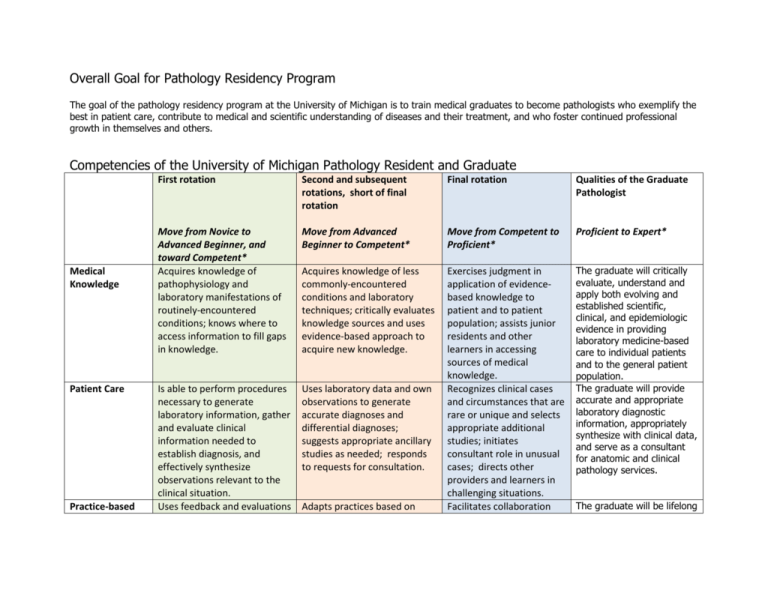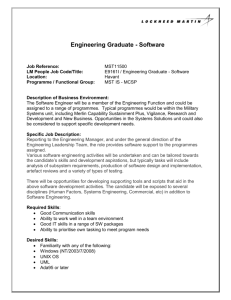Overall Goal and Objective of the Anatomic and Clinical Pathology
advertisement

Overall Goal for Pathology Residency Program The goal of the pathology residency program at the University of Michigan is to train medical graduates to become pathologists who exemplify the best in patient care, contribute to medical and scientific understanding of diseases and their treatment, and who foster continued professional growth in themselves and others. Competencies of the University of Michigan Pathology Resident and Graduate Medical Knowledge Patient Care Practice-based First rotation Second and subsequent rotations, short of final rotation Final rotation Qualities of the Graduate Pathologist Move from Novice to Advanced Beginner, and toward Competent* Acquires knowledge of pathophysiology and laboratory manifestations of routinely-encountered conditions; knows where to access information to fill gaps in knowledge. Move from Advanced Beginner to Competent* Move from Competent to Proficient* Proficient to Expert* Acquires knowledge of less commonly-encountered conditions and laboratory techniques; critically evaluates knowledge sources and uses evidence-based approach to acquire new knowledge. Is able to perform procedures necessary to generate laboratory information, gather and evaluate clinical information needed to establish diagnosis, and effectively synthesize observations relevant to the clinical situation. Uses feedback and evaluations Uses laboratory data and own observations to generate accurate diagnoses and differential diagnoses; suggests appropriate ancillary studies as needed; responds to requests for consultation. Exercises judgment in application of evidencebased knowledge to patient and to patient population; assists junior residents and other learners in accessing sources of medical knowledge. Recognizes clinical cases and circumstances that are rare or unique and selects appropriate additional studies; initiates consultant role in unusual cases; directs other providers and learners in challenging situations. Facilitates collaboration The graduate will critically evaluate, understand and apply both evolving and established scientific, clinical, and epidemiologic evidence in providing laboratory medicine-based care to individual patients and to the general patient population. The graduate will provide accurate and appropriate laboratory diagnostic information, appropriately synthesize with clinical data, and serve as a consultant for anatomic and clinical pathology services. Adapts practices based on The graduate will be lifelong Learning and Improvement to generate or modify learning plan and improve sills. literature review, case outcomes, peer reviews, and system demands; seeks and gives feedback to improve self and others. and teamwork to improve patient care and promote learning. Interpersonal and Communication Skills Establishes collegial interactive and communication skills in dealing with others in the health care community; structures reports that are clear, succinct, and follow templates; listens to and responds to requests from other providers. Is honest, compassionate, and respectful of others; complies with laws and regulations pertaining to medical practice; fulfills patient care and educational responsibilities faithfully. Understands professional responsibility to appear for duty rested and fit to provide service. Identifies issues related to error, cost, and the need for interdisciplinary collaboration in the delivery of health care. Conducts handoff at the conclusion of rotation with Effectively communicates in a variety of settings, including during conferences, while providing consultations, and teaching peers. Demonstrates skill in dealing with conflicting opinions or perspectives; responds independently to questions from other providers, patients, and families; generates sophisticated reports that relay information about complex cases. Recognizes impairment in themselves and peers and takes steps to address this. Mentors others in use of inter-professional and multi-disciplinary collaboration; Is a role model to other learners regarding accountability to self and others. Identifies sources of error and inefficiency and initiates action to assess and fix; acts as a consultant in conducting cost benefit analysis Professionalism Systems-based Practice Manages patient care duties and interacts with other providers with compassion and respect for diversity; recognizes and responds to need for help from colleagues. Improves patient outcomes and promotes efficiency by making decisions based on best evidence of outcomes, and by involvement in quality initiatives. learner and motivate others to learn by actively assessing his/her knowledge, skills, and practice, then seeking, appraising, and assimilating scientific evidence to improve patient care practices. The graduate effectively and respectfully communicates with and teaches members of the health care community, patients and families, receiving and relaying diagnostic information to enhance its clinical value. The graduate is committed to fully carrying out his/her professional responsibilities, adheres to ethical principles, respects the roles of other health care providers, and is sensitive to the diversity that is inherent in the patient population and health care community. The graduate uses his/her understanding of the role of pathology in the context of the larger health care system to access resources that will facilitate optimal patient care, analyze data care and thoroughness. regarding effective and safe use of laboratory medicine in the delivery of patient care. for the benefit of patient populations, and manage both individual cases and entire laboratories to effectively deliver patient services. *Descriptions of Dreyfus Levels of Learning Novice: A novice knows little about the subject, and rigidly adheres to rules with little situational perception. He/she does not feel responsible for outcomes. Advanced Beginner: The advanced beginner is still dependent on rules, but can adapt rules to changing circumstances. However, all attributes of a situation tend to be given equal importance, and there is still little feeling of personal responsibility for outcomes. Competent: The competent learner grasps the relevant facts, can sort information by relevance, can bring his/her own judgment to each case, and solve problems. Guidelines are adapted to unexpected events. He/she feels accountable for outcomes because of increasing decision-making. Proficient: The proficient learner has progressed from step-by-step analysis and task performance to a holistic perception of the entirety of the situation. He/she uses pattern recognition and intuition arising from experience to identify problems, and perceives deviations from the expected. Actions are guided by principles, and situations are appreciated in a larger context. He/she can reflect on experiences to correct errors and improve, and can learn from others’ experiences. Sense of responsibility grows with increasing decision-making. Expert: The expert knows a subject thoroughly, intuitively sees the appropriate actions and answers to problems, rather than needing rules. His/her sense of responsibility extends to others and the entire system; he/she is a teacher.





